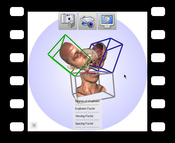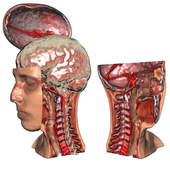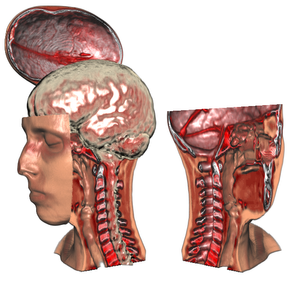Information
- Replaced by: bruckner-2006-EVV
- Publication Type: Technical Report
- Workgroup(s)/Project(s):
- Date: April 2006
- Keywords: exploded views, illustrative visualization, volume rendering
Abstract
Exploded views are an illustration technique in which an object is partitioned into several segments. These segments are displaced to reveal otherwise hidden detail. In this paper we apply this concept to volumetric data in order to solve the general problem of occlusion. In many cases an object of interest is occluded by other structures which nonetheless provide important context information. While transparency or cutaways can be used to reveal a focus object, the problem of these techniques is that they remove parts of the information. Exploded views, on the other hand, do not suffer from this drawback. Our approach employs a force-based model: the volume is divided into a part configuration controlled by a number of forces and constraints. The focus object exerts an explosion force causing the parts to arrange according to the given constraints. We show that this novel and flexible approach allows for a wide variety of explosion-based visualizations including view-dependent explosions. Furthermore, we present a high-quality GPU-based volume ray casting algorithm for exploded views which allows rendering and interaction at several frames per second.Additional Files and Images
Additional images and videos
 Demonstration:
Exploded views demonstration (DivX encoded AVI video)
Demonstration:
Exploded views demonstration (DivX encoded AVI video)
 Image:
Exploded volume data view using part constraints
Image:
Exploded volume data view using part constraints
Additional files
Weblinks
No further information available.BibTeX
@techreport{TR-186-2-06-03,
title = "Exploded Views for Volume Data",
author = "Stefan Bruckner and Eduard Gr\"{o}ller",
year = "2006",
abstract = "Exploded views are an illustration technique in which an
object is partitioned into several segments. These segments
are displaced to reveal otherwise hidden detail. In this
paper we apply this concept to volumetric data in order to
solve the general problem of occlusion. In many cases an
object of interest is occluded by other structures which
nonetheless provide important context information. While
transparency or cutaways can be used to reveal a focus
object, the problem of these techniques is that they remove
parts of the information. Exploded views, on the other hand,
do not suffer from this drawback. Our approach employs a
force-based model: the volume is divided into a part
configuration controlled by a number of forces and
constraints. The focus object exerts an explosion force
causing the parts to arrange according to the given
constraints. We show that this novel and flexible approach
allows for a wide variety of explosion-based visualizations
including view-dependent explosions. Furthermore, we present
a high-quality GPU-based volume ray casting algorithm for
exploded views which allows rendering and interaction at
several frames per second.",
month = apr,
address = "Favoritenstrasse 9-11/E193-02, A-1040 Vienna, Austria",
institution = "Institute of Computer Graphics and Algorithms, Vienna
University of Technology ",
note = "human contact: technical-report@cg.tuwien.ac.at",
keywords = "exploded views, illustrative visualization, volume rendering",
URL = "https://www.cg.tuwien.ac.at/research/publications/2006/TR-186-2-06-03/",
}


 Technical Report
Technical Report